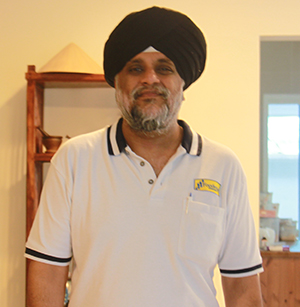Case Study: How E-commerce Gave Us A Taste Of Sweeter Success
Learn about the benefits of digital innovation from Mr Manmeet Singh, CEO of Foodedge Gourmet Pte Ltd, who shares about the challenges he faced in his business and how adding an online ordering channel significantly increased his company’s sales in spite of a competitive food industry.
Please tell us more about your business.
Meldavos Singapore is the retail brand of Foodedge Gourmet, a Singapore-based wholesale bakery and kitchen. We supply food and beverage products to key clients such as major airlines, restaurants, hotels, country clubs, supermarkets, convenience stores, care chains, office pantries and fine dining outlets in Singapore. Since 2002, Foodedge Gourmet has grown to become an influential business in the wholesale food and beverage industry with a company of 70 staff serving the needs of more than 400 clients countrywide.
Our tagline is “Your Outsource Chef” which represents our commitment to provide gourmet food of every kind from appetizers to desserts. Our business’ core strength is the ability to provide any business, eatery or otherwise, customized products at wholesale prices. Small teams work with our various clients daily to create unique and exclusive products for their businesses. All our food inventions are created and baked right here in Singapore. Some of the extraordinary creations include Tuna Ice Cream and Foie Gras Ice Cream.
The aim of Melvados is to meet the rising needs of food-loving Singapore residents who are too busy to whip up a gourmet meal for themselves. Our own passion for food is what led us to create a host of ready–to-eat meals and delicious desserts perfect for hectic days at work, to feed busy school children in between classes, for dinner parties, potlucks and even BBQs. These products are sold online and at our newly opened retail outlet in Joo Chiat.
What are some of the biggest challenges you face in your business?
Some of the difficulties we faced have to do with getting sufficient manpower. In our early years, it was hard to convince people to take a chance in our start-up and join us full time. Although we are more established now, it has become increasingly difficult to get staff to work on the production lines, especially with stringent rules on obtaining foreign labour.
The competitive nature of the industry coupled with the small size of the Singapore market pose another challenge. There's only so much you can achieve in Singapore before you hit a plateau in terms of growth. That's why we are looking for opportunities to expand overseas, which we consider as the next phase of our company's evolution.
What was your marketing strategy and what groundwork did you have to do before embarking on e-commerce?
Our company's vision has always been to think big. That’s why we devote our time into developing two strong pillars for our business – the wholesale and the retail channels. To grow our retail brand Melvados, we employed e-commerce solutions and other online platforms.
When we started, we were only a small, but nimble, team and were strapped for cash. Hence, we relied heavily on ourselves, studying basic research materials like books and research papers to understand how the e-commerce medium works. We also asked some of our wholesale clients who had successfully implemented e-commerce and social media to learn from their advice and experiences.
How did you set up your e-commerce platform and why?
We started by creating a comprehensive website with purchase capabilities. On ground, we readied the infrastructure to deal with increased sales so that our delivery trucks will continue to provide efficient service. We also set up a Facebook page and heavily promoted it via emailers to encourage customers to explore our online options and share their positive experiences. Complementing our online store, we have monthly food sampling at our factory for those who are hesitant to come and try before they buy. It's also a way for us to engage with them face-to-face.
How are the results?
Our retail sales increased 10% after the first year of launch. A recent in-house marketing survey conducted showed that a majority of our clients found us through word-of-mouth either by friends or family. Surprisingly, our wholesale clientele also increased their orders with some wanting to buy in bulk and others using our customization services for the first time. With such encouraging results, we decided to revamp our website, which was built in 2006, to better suit the present market conditions and consumers’ preferences.
Any advice for SMEs wanting to go into e-commerce?
The biggest hurdle we faced as a small start-up was the need to make decisions and do everything with limited knowledge. This delayed our progress because we had to learn on the job, and fast. We made many mistakes along the way while tackling all other daily processes hand-in-hand. We also fell behind because we didn't have the time or capability to consistently monitor the industry. On hindsight, I think we would’ve done better if we had invested in hiring a professional.
My advice for start-ups is to engage professional experts who’ll teach you the ropes. It is definitely a worthy investment in a fast-paced and dynamic industry especially in the F&B sector. You have to be quick and versatile to keep up with the market, and a consultant with vast experiences can help put in place systems that effectively react to changes.
- Create opportunities to bring customers online to in store to sustain the engagement
- Learn from the experiences of others who have done it
